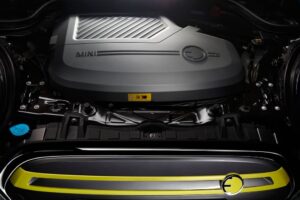Weekdays 8:00am-5:00pm Sat Closed Sun Closed

Your Mini Cooper's suspension has numerous functions, including keeping your wheels on the road, improving grip for braking, and helping you drive smoothly even on bumpy, uneven roads. Perhaps most importantly, however, it lets your steering absorb lateral forces, helping to keep the car stable so it does not roll over.
Your car's suspension system has springs, struts, and shock absorbers, which we call dampers. These parts work together to keep you safe while driving. When you go over bumpy roads, the shock absorbers absorb the impact, preventing excessive movement in your suspension.
The springs take in the pressure from the wheels as they go over surfaces. The struts reduce vibrations and provide support for the suspension system. A lot is happening, so keeping your suspension working is crucial. Your Mini Cooper has European suspension, mostly made of lightweight aluminum.
This makes it soft, so it might bend easily when bumped, even by small things like a pothole at medium speeds. Considering all this, knowing when to call your professional mechanic for a Mini suspension repair is important.

Have you suddenly started experiencing bumps inside the car? If yes, it is one of the most apparent indicators of the worn-out suspension system. Suppose you start feeling every pothole and even small undulations on the road filtering directly into the cabin. In that case, it indicates that your car's suspension system has been damaged and requires corrective maintenance.
Most of the time, this condition hints that the piston-cylinder assembly inside the shock absorber of the suspension might be worn out and need replacement. However, this bumpy ride could also be on the part of the damaged strut, and hence you should get the whole suspension assembly of the car checked thoroughly.
Do you feel drifting or pulling when you turn? This might mean your Mini Cooper's body isn't steady during turns due to weak shocks. This is risky, increasing the chance of rolling over. Contact your service station when you notice drifting to book an appointment for a Mini suspension repair.
It's totally normal to feel surprised if you come to a shop and feel like the Mini Cooper lurches forward or bends downwards. When you press the brakes, your car needs to stop smoothly. If the suspension is bad, stopping suddenly to prevent accidents becomes hard. In that case, it's a sign to go to a specialized mechanic for a Mini suspension repair.
While uneven tire treads can suggest a few problems, it also indicates you have bad suspension. This is because the suspension isn't keeping your car and its wheels evenly on the ground. As a result, you'll see uneven wear and tear on the treads, such as bald spots. Uneven pressure while driving is also dangerous, so immediate attention is advised.

This one is difficult to spot as you must look under the vehicle. If you have been experiencing any of the above issues, you can look at the shocks and struts to see if they're greasy. This indicates they are leaking fluid, so something isn't working or is damaged. Your certified mechanic can always check if getting down to look yourself sounds too much work!
If you are experiencing bad steering on your Mini Cooper, such as a slipping feeling, some causes can be low power steering fluid, worn or loose power steering belts, faulty power steering pumps, leaking power steering racks, and worn arm bushings. Take this immediately, as it is an unsafe way to drive.
In the case of a worn-out suspension system, you might also start experiencing the phenomenon of nose-diving. When you apply the brake, you feel the car's body lurches forward in nose-diving. The situation becomes disconcerting in case of emergency braking when you push hard on the pedal to avoid some imminent collision.
The nose-diving seriously affects your safety and security as it interferes with your car's ability to stop within the required distance. The impact of nose-diving on braking can be gauged from the fact that it can negatively affect your car's stopping time by as much as 20%. In such a situation, you should get this fault rectified as soon as possible.
If you notice any of the signs above, you can take the bounce test and want a better idea if your suspension is having issues. Place the car in park, get out, put your full weight on the front, and bounce a few times. Let go and then try the same at the rear. Your suspension needs repair if your car is still rocking or bouncing when you stop.
Since the suspension is so important for a safe and smooth drive, any of these symptoms call for an appointment to fix it. The longer you wait, the higher risk you have for accidents. A Mini suspension repair is pretty straightforward, so if you are worried about being out of commission without a car for too long, don't.

It is also inexpensive compared to the potential damage caused by an accident because of faulty suspension. To repair the suspension, your certified mechanic will look at all the components, like the shock absorbers, springs, struts, and the entire system's function. The necessary repairs or replacements will differ based on worn or damaged parts.
Now that you already have an understanding of the signs that indicate Mini suspension problems, here are our top tips to prevent that from happening:
Ask the mechanic to check the ride height during the maintenance procedures and maintain the original ride height. Optimal ride height ensures the car runs optimally without straining any mechanical component, including shock absorbers, struts, ball-bearing, anti-roll bar, etc.
Stick to the original, company-certified spare parts that need to be used not only in the suspension system but also on your car's other mechanical and electric systems. Repairing the car with duplicate, low-cost products harms you more than good. They might save you a few bucks initially, but their cheap quality and shorter life will double your cost in the long run.

Regarding replacement shock absorbers or struts, we suggest you do it in pairs rather than replacing only the damaged ones. This will help to extract optimum performance from your car's suspension system.
You should also take your car to the authorized dealership or service center rather than trying to correct things at a local garage. Also, you should preserve receipts of the maintenance work, as it'll come in handy if you start experiencing issues related to shocks and struts immediately after the repair.
Remember, the suspension system of the car is one of its vital components, which cushions you by ironing out road unconformities. Its optimal working is mandatory for a safe and secure driving experience. Many need to pay more attention to its importance due to a lack of awareness, but believing ignorance is bliss won't help. Therefore you should be informed and closely monitor these signs to identify the problem in your car's suspension system early.

